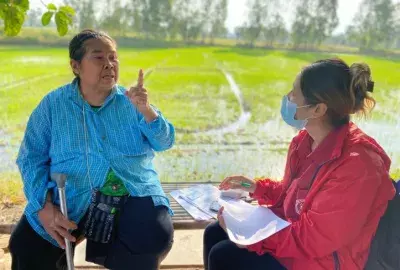Error message

Loss of the world's forests contributes an estimated 17 percent to all global greenhouse gas emissions, creating both a major challenge and an opportunity for international climate change agreements. In response, global policymakers have proposed that new carbon agreements include rewards for reducing forest-based emissions, an initiative known as REDD--Reducing Emissions from Deforestation and Forest Degradation. By creating financial incentives to reduce forest-sourced greenhouse gases, REDD projects could generate funding from developed countries to reduce deforestation in developing countries. In addition, some climate change specialists believe that REDD projects could benefit forest-dependent communities, whose participation is key to controlling the local forces that drive deforestation. Some communities are already learning about the new REDD carbon projects. As one villager from Cambodia explains, "We are going to sell our air to the people who are polluting in the city."
The increased attention to forests in international climate change negotiations indicates that policymakers are giving greater recognition to the importance of natural forests as terrestrial carbon sinks. While it is generally acknowledged that forests are an important source of timber, fuelwood, fodder, and other nontimber forest products, forests also provide crucial ecosystem services. These "services" are functions or benefits that are provided by the natural environment including sequestering carbon from the atmosphere, protecting upstream watersheds, and conserving biodiversity. Forests also help regulate the water cycle and climate, while supporting soil formation, nutrient recycling, and plant pollination. The failure of markets, and society in general, to accurately value these services in economic or financial terms has undermined attempts to conserve forests. The REDD climate initiatives represent an important international attempt to place a value on forests and to commoditize their services in storing and sequestering carbon. The value of forest carbon stocks will need to be based on rigorous monitoring of field inventories and remotely sensed data. It is anticipated that REDD projects will need to empirically demonstrate that deforestation and forest degradation have slowed as a direct result of project activities. The resulting change in carbon storage will need to be verifiable before it can be traded in commodity markets and other exchange platforms.
The views expressed in this publication are those of the authors and not necessarily those of the Center.
Loss of the world's forests contributes an estimated 17 percent to all global greenhouse gas emissions, creating both a major challenge and an opportunity for international climate change agreements. In response, global policymakers have proposed that new carbon agreements include rewards for reducing forest-based emissions, an initiative known as REDD--Reducing Emissions from Deforestation and Forest Degradation. By creating financial incentives to reduce forest-sourced greenhouse gases, REDD projects could generate funding from developed countries to reduce deforestation in developing countries. In addition, some climate change specialists believe that REDD projects could benefit forest-dependent communities, whose participation is key to controlling the local forces that drive deforestation. Some communities are already learning about the new REDD carbon projects. As one villager from Cambodia explains, "We are going to sell our air to the people who are polluting in the city."
The increased attention to forests in international climate change negotiations indicates that policymakers are giving greater recognition to the importance of natural forests as terrestrial carbon sinks. While it is generally acknowledged that forests are an important source of timber, fuelwood, fodder, and other nontimber forest products, forests also provide crucial ecosystem services. These "services" are functions or benefits that are provided by the natural environment including sequestering carbon from the atmosphere, protecting upstream watersheds, and conserving biodiversity. Forests also help regulate the water cycle and climate, while supporting soil formation, nutrient recycling, and plant pollination. The failure of markets, and society in general, to accurately value these services in economic or financial terms has undermined attempts to conserve forests. The REDD climate initiatives represent an important international attempt to place a value on forests and to commoditize their services in storing and sequestering carbon. The value of forest carbon stocks will need to be based on rigorous monitoring of field inventories and remotely sensed data. It is anticipated that REDD projects will need to empirically demonstrate that deforestation and forest degradation have slowed as a direct result of project activities. The resulting change in carbon storage will need to be verifiable before it can be traded in commodity markets and other exchange platforms.
The views expressed in this publication are those of the authors and not necessarily those of the Center.







